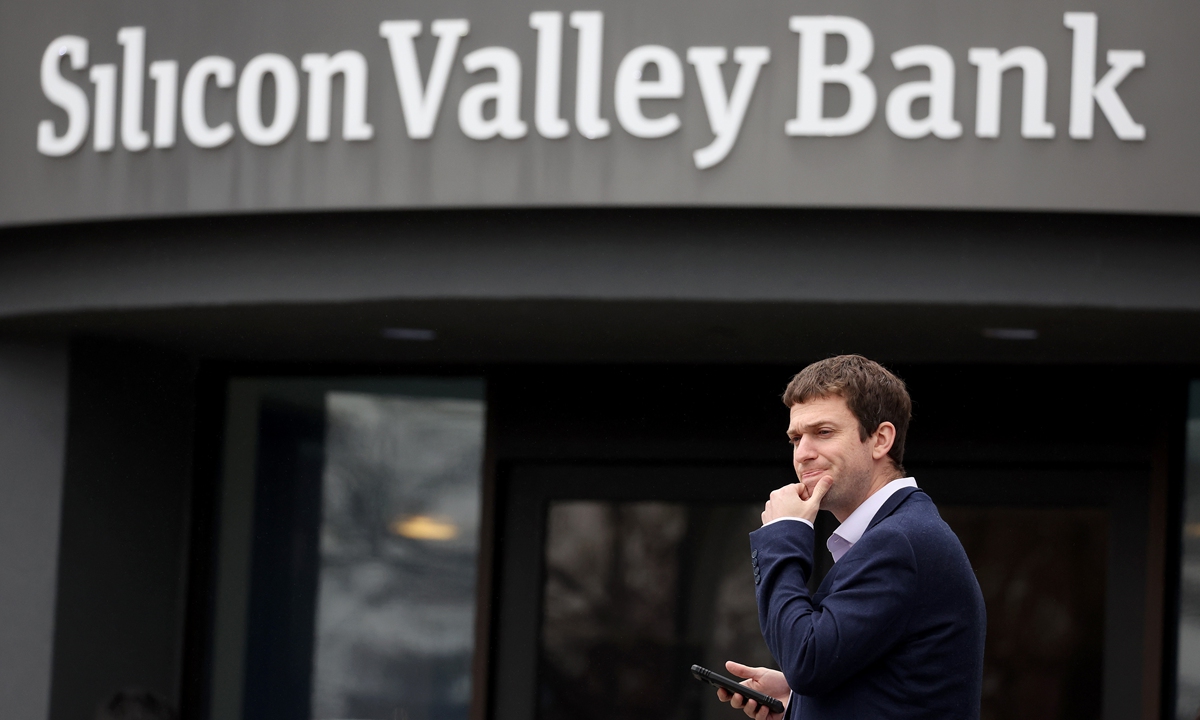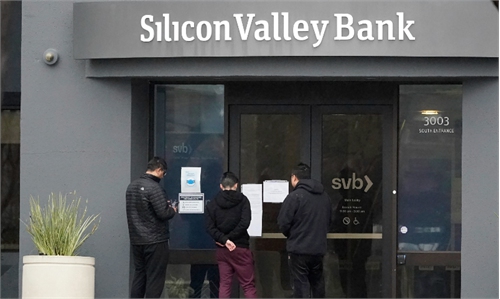
A customer stands outside of a shuttered Silicon Valley Bank (SVB) headquarters on March 10, 2023 in Santa Clara, California. Photo: VCG
While Wall Street analysts said the failure of Silicon Valley Bank (SVB) won't lead to any systemic risk to the broader financial system, it should be noted that US regulators' measures to tackle with the SVB fall and handling of its customers' deposits will offer an important window to see whether the crisis has the potential to magnify.The collapse of SVB is causing shockwaves to start-ups around the world, as tech companies have warned that the potential fallout could deal a fatal blow to tech start-ups and the entire sector if respective governments do not intervene.
In the UK, more than 200 UK-based tech company executives urged Downing Street to step in, warning that many companies faced an "existential threat" because they banked with the UK arm of SVB, the Financial Times reported on Sunday.
SVB also has branches in Canada, Denmark, Germany, India, Israel, Sweden and China. At present, SVB customers, which are not covered by the insurance scheme of the Federal Deposit Insurance Corporation (FDIC), are waiting anxiously to find out if they can recover their deposits, including many Chinese tech start-ups. Some US-listed Chinese companies may have banked their IPO proceeds at SVB, and many Chinese high-tech companies that received US dollar-denominated investments may deposit the funds in SVB before the money is settled and transferred to their domestic bank accounts, according to Chinese media reports.
It is important to note that during the handling of the SVB failure, the interests of tech start-ups and investors, whether from China or the UK, or from any other country around the world, need to be guaranteed, even if they may not be covered by the US government-backed insurance scheme. If the interests of any start-up company end up being sacrificed in the crisis' black hole, it will have catastrophic consequences for both market confidence and liquidity. Therefore, it is time for US regulators to take the responsibility to ensure that depositors can get their money back so as to prevent bank customer panic from spreading.
This is because the fall of SVB, the largest bank failure since the 2008 financial crisis, may be just the tip of the iceberg of a systemic liquidity crisis. It fell down because of a bank run as investors were eager to transfer their deposits after learning SVB had suffered heavy losses due to the aggressive rate hikes by the Federal Reserve. More or less, the problems with SVB also exist at other American banks, and needless to say, the SVB collapse in just 48 hours will cause customers to have concerns about their own deposits at other small and medium-sized banks.
That is to say, if US regulators fail to properly handle the SVB fallout to curb the ripple effect, market panic will spread and more bank runs will take place. Therefore, the severity of the consequences of the SVB collapse actually hinges on whether US regulators can handle the crisis properly.
Many have likened the SVB collapse to the Lehman Brothers crisis of 2008. However, Lehman Brothers collapsed due to a debt crisis, while SVB imploded due to a liquidity crunch. The fact that SVB's failure came just days after it was listed in Forbes magazine's annual ranking of the best banks in America is actually a more worrying sign about the US economy.
The Fed's struggle to balance its conflicting goals of taming in inflation and maintaining growth, with the US economy teetering on the brink of a hard landing and the possibility of fighting a high inflation in the long run, has further dented investor confidence and more easily led to liquidity crunch. The US financial system is suffering economic repercussions for its irresponsible monetary policy.
In this sense, it now seems necessary to advise Chinese companies and investors to watch out for potential risks when it comes to putting money into US financial institutions and assets. Chinese investors need to take appropriate measures and precautions such as insurance to reduce their exposure to the growing risks in US financial markets in case of such a black swan event as Blackstone and SVB.

